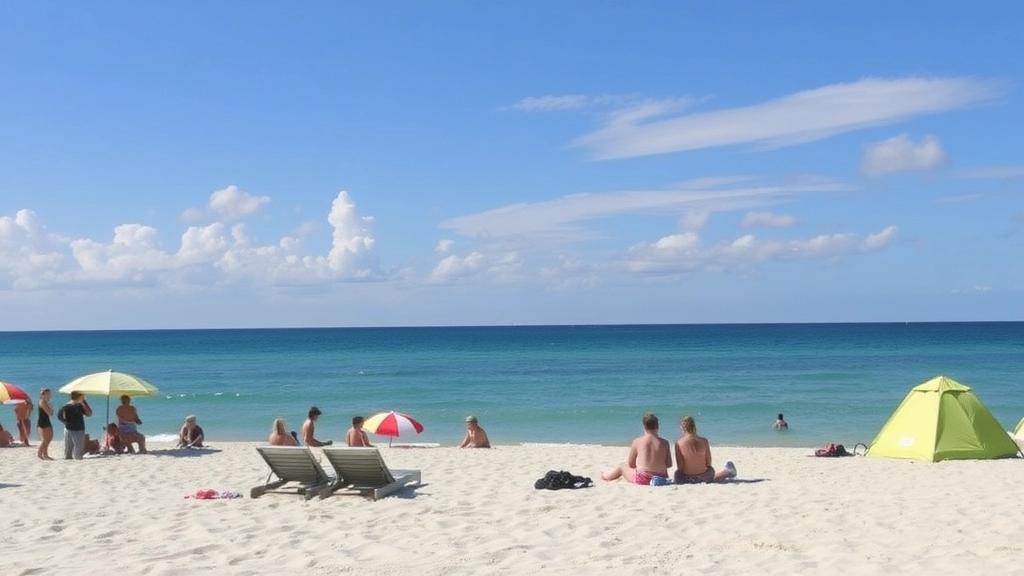Summer Camp Beach: An Unforgettable Experience
Summer is just around the corner, and what better way to make it unforgettable than by sending your child to a summer camp beach? From Cornwall to Pembrokeshire, we’ve curated a list of top destinations that promise both fun and learning. This article will guide you through the best locations, the diverse activities offered, and the invaluable benefits of attending a beach camp.
We’ll also help you navigate the process of choosing the right camp for your child, packing essentials, and crucial safety tips. Plus, hear firsthand testimonials from campers and parents to ease any concerns. Ready to dive in? Let’s explore everything you need to know to make this summer the best one yet!
Popular Summer Camp Beach Destinations
Alright, let’s get straight to it. You’re probably wondering, “Where should I send my kid for an awesome beach camp experience?” Great question. Picking the right destination can make or break their summer. So, let’s dive into some of the top spots that have been getting rave reviews.
Cornwall, England
Cornwall is a gem. Think stunning beaches, surf schools, and plenty of sunshine. Kids can learn to surf at Fistral Beach or explore tidal pools at Porthcurno. It’s not just about the water; the local culture and history add a rich layer to the experience.
Brighton, England
Brighton is another fantastic option. Known for its vibrant pier and bustling beach scene, it’s perfect for kids who enjoy a mix of activities. From paddleboarding to beach volleyball, there’s something for everyone. Plus, the city’s lively atmosphere keeps things exciting.
Bournemouth, England
If you’re looking for a classic beach experience, Bournemouth is the place to be. With its seven miles of sandy beaches and clear waters, it’s a haven for water sports. The camps here often include sailing and kayaking programs, making it a hit among adventure-seeking kids.
The Isle of Wight
This destination offers a unique blend of natural beauty and adventure. The Isle of Wight has some of the best beaches in the UK, and camps here often focus on marine biology, sailing, and even fossil hunting. It’s educational and fun rolled into one.
Devon, England
Devon’s beaches are nothing short of spectacular. Camps here offer everything from surfing lessons to coastal hikes. It’s a great spot for kids who love the outdoors and want to try a bit of everything.
Pembrokeshire, Wales
Don’t overlook Wales. Pembrokeshire boasts some of the most beautiful beaches in the UK. Camps here are big on adventure sports like coasteering and cliff diving. If your kid is a thrill-seeker, this is the place to be.
Why These Destinations?
Each of these spots offers something unique, whether it’s the type of activities, the natural scenery, or the local culture. And let’s be real, the best beach camp is the one that keeps your kid engaged, active, and coming home with stories they’ll be talking about for months.
For more tips on packing for these beach camps, check out our Summer Camp Packing List. And if your child loves sports, don’t miss our Summer Sports Camp Benefits and Preparation guide.
Activities and Programs Offered
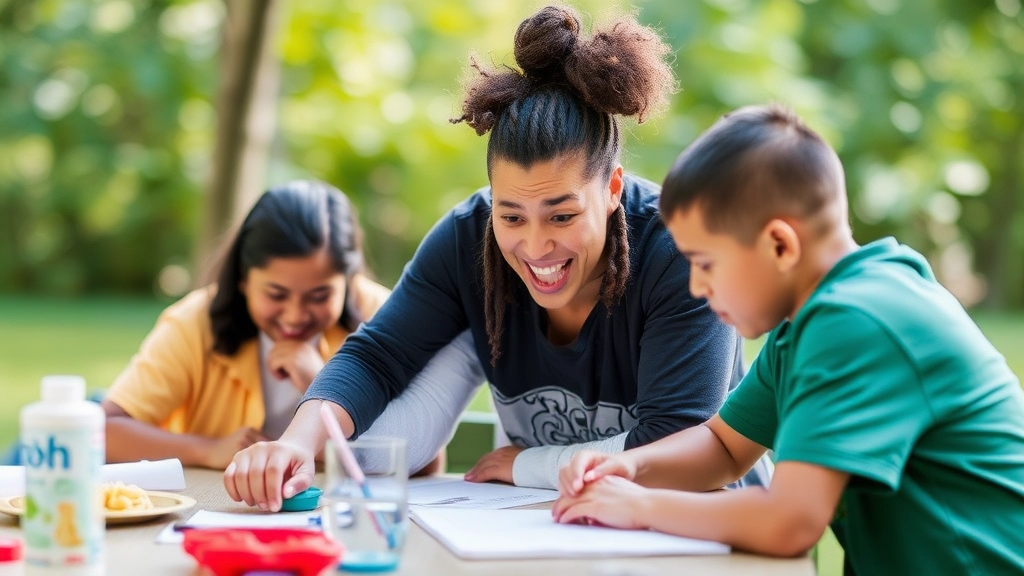
Alright, let’s get straight to it.
What’s the deal with beach camps?
Why do kids love them?
And what exactly do they do all day?
Activities and Programs Offered
When you think of a beach camp, you probably imagine sandcastles and swimming. But trust me, there’s so much more on offer.
Water Sports Galore
- Surfing: Beginners to pros, everyone gets a shot.
- Kayaking: Paddle around, explore the waters.
- Snorkelling: Dive in and meet the fish.
Team Sports and Games
- Beach Volleyball: Classic, right?
- Soccer: But on sand, which makes it way more interesting.
- Capture the Flag: A camp favourite.
Creative Workshops
- Sand Sculpting: Way beyond your average sandcastle.
- Tie-Dye: Make your own camp gear.
- Art and Craft: Let the creativity flow.
Adventure and Exploration
- Beach Hikes: Discover hidden coves.
- Marine Biology Sessions: Learn about the ocean life.
- Night-Time Bonfires: S’mores, stories, and stargazing.
Life Skills and Personal Development
- Leadership Programs: Build confidence and teamwork.
- First Aid Training: Always handy.
- Environmental Awareness: Teach kids to respect nature.
Why These Activities Rock
Kids aren’t just having fun; they’re learning. They’re gaining confidence, making friends, and discovering new passions.
And let’s be real, they’re getting a break from screens.
Real Stories
I remember a camper named Jake. First day, he was shy, didn’t want to join in. By the end of the week, he was leading his team in beach volleyball and planning a marine biology project. That’s the magic of these programs.
So, if you’re considering a beach camp, know this: it’s not just a holiday. It’s an experience packed with activities that shape young minds and bodies.
Benefits of Attending a Beach Camp
Why Consider a Beach Camp?
Ever wondered why beach camps are all the rage? Are you curious about what makes them stand out from the usual summer camp options? Let’s dive into the benefits of attending a beach camp and see why it might be the perfect fit for your child.
Why Beach Camps Rock
First off, a beach camp isn’t just about sun and sand. It’s about adventure, learning, and making memories. Here’s why a beach camp can be a game-changer for your child:
- Connection with Nature: Kids get to explore marine life, understand ecosystems, and appreciate the beauty of the natural world. It’s like a live-action science class, but way more fun.
- Physical Activity: From swimming to beach volleyball, there’s no shortage of ways to stay active. It’s all about getting those endorphins flowing while having a blast.
- Social Skills: Meeting new friends and working as a team in activities builds confidence and communication skills. It’s not just about making friends; it’s about learning to thrive in a group.
- Creative Exploration: Art projects using natural materials, storytelling by the campfire, or even learning to surf. Creativity knows no bounds at a beach camp.
Personal Growth and Independence
You’re probably wondering how a week or two at the beach can really change a kid. Well, here’s the scoop:
- Independence: Being away from home teaches kids to manage their time and make decisions. It’s about stepping out of comfort zones and growing up a little.
- Confidence Boost: Mastering a new skill, like paddleboarding, can skyrocket a child’s self-esteem. It’s the kind of confidence that sticks.
Real Stories, Real Impact
I remember chatting with a fellow parent over coffee. Her son, once shy and reserved, came back from beach camp with a newfound zest for life. He’d learned to surf, made lifelong friends, and couldn’t stop talking about the campfire stories.
Choosing the Right Beach Camp
Now, it’s crucial to pick the right camp that matches your child’s interests. Consider factors like location, activities offered, and the camp’s philosophy. For more tips, check out our guide on summer camp weekly themes.
Packing Essentials and Safety Tips
Don’t forget the essentials! From sunscreen to water bottles, packing right can make all the difference. Plus, staying safe is key. Our summer camp packing list has got you covered.
Choosing the Right Beach Camp for Your Child
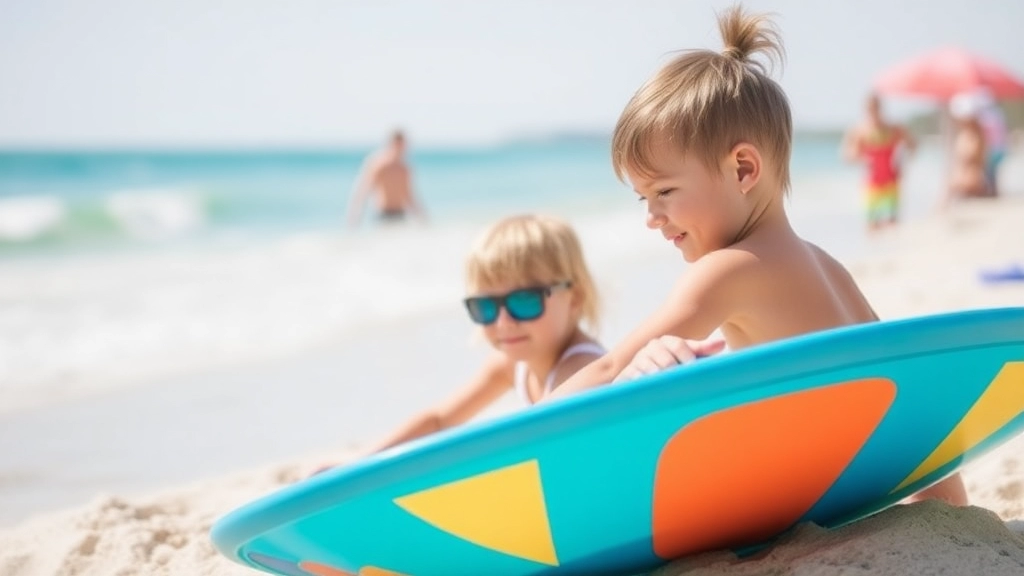
Choosing the right beach camp for your child can feel overwhelming.
I get it.
You want your kid to have the best summer ever, but how do you know which camp is the right fit?
Let’s break it down.
What are your child’s interests?
- Water sports enthusiast? Look for camps offering surfing, kayaking, or paddleboarding.
- Nature lover? Camps with marine biology programs or eco-friendly activities might be the ticket.
- Social butterfly? A camp with lots of group activities and social events could be perfect.
Location, Location, Location
- How far are you willing to travel?
- Do you prefer a camp close to home or a more exotic destination?
- Check out the camp’s beach – is it safe and clean?
Camp Philosophy and Values
- Does the camp emphasise teamwork, leadership, or creativity?
- Are the values aligned with what you want for your child?
Safety First
- Staff qualifications: Are the instructors certified in CPR and first aid?
- Camper-to-staff ratio: More staff usually means better supervision.
- Safety protocols: What measures are in place for emergencies?
Testimonials and Reviews
- Word of mouth: Ask friends or family for recommendations.
- Online reviews: Check out what other parents and campers have to say.
- Camp tours: If possible, visit the camp beforehand.
Cost and Inclusions
- What’s the fee, and what does it cover?
- Are meals, equipment, and excursions included, or are they extra?
Special Needs and Dietary Restrictions
- Does the camp accommodate allergies or special dietary needs?
- Are there programs for children with special needs?
Real Talk: Your Concerns
- Worried about your child’s safety? Check the camp’s safety record.
- Concerned about homesickness? Look for camps with strong communication policies.
- Unsure about the camp’s credibility? Verify their accreditation.
For more tips on selecting the perfect beach camp, check out our detailed guide on Activities and Programs Offered.
Happy camping!
Packing Essentials for a Beach Camp
Alright, let’s get real for a second. Thinking about sending your kid to a beach camp? I bet you’re stressing over what to pack. We’ve all been there. You want to make sure your child has everything they need, but you don’t want to overpack either. So, let’s break it down, nice and easy.
Packing Essentials for a Beach Camp
First off, what are the absolute must-haves for a beach camp? Here’s a quick rundown to get you started:
- Swimwear: This one’s a no-brainer. Pack at least two swimsuits so your kid always has a dry one on hand. Trust me, no one likes putting on a wet swimsuit.
- Towels: Bring a couple of beach towels. One for drying off and one for lounging on the sand. Pro tip: Microfiber towels dry faster and take up less space.
- Sunscreen: You can never have too much sunscreen. Go for SPF 50 or higher and make sure it’s water-resistant. The sun’s no joke.
- Hat and Sunglasses: Protect those little faces and eyes from the harsh sun. A wide-brimmed hat and UV-protection sunglasses are key.
- Water Shoes: These are great for protecting feet from hot sand, sharp shells, and rocky areas. No one wants a foot injury ruining their camp experience.
- Change of Clothes: Pack light, breathable clothes. Think shorts, t-shirts, and a light jacket for cooler evenings.
- Reusable Water Bottle: Hydration is crucial. A good quality, reusable water bottle will keep your child hydrated throughout the day.
- Snacks: While camps usually provide meals, having some extra snacks like granola bars or fruit can be a lifesaver.
- Toiletries: Don’t forget the basics like toothbrush, toothpaste, shampoo, and soap. A small toiletry bag works wonders.
- First Aid Kit: A mini first aid kit with band-aids, antiseptic wipes, and any necessary medications is a smart move.
- Beach Bag: A sturdy, sand-proof bag to carry all these essentials. Make sure it’s big enough but not too bulky.
Why These Essentials Matter
Imagine your kid coming back sunburned because they didn’t have enough sunscreen, or stepping on a sharp shell because they didn’t have water shoes. These essentials aren’t just about comfort; they’re about safety and making sure your child has the best experience possible.
Real Stories, Real Solutions
I remember when I went to beach camp as a kid. My mum forgot to pack water shoes, and I ended up with a nasty cut on my foot. Not fun. So, trust me on this one â these items are non-negotiable.
Internal Links for More Tips
While you’re here, check out our guide on Summer Camp Essentials for a comprehensive list of items to pack. And don’t miss our Swimming Safety Tips to keep your kiddo safe and sound in the water.
Safety Tips for Beach Campers
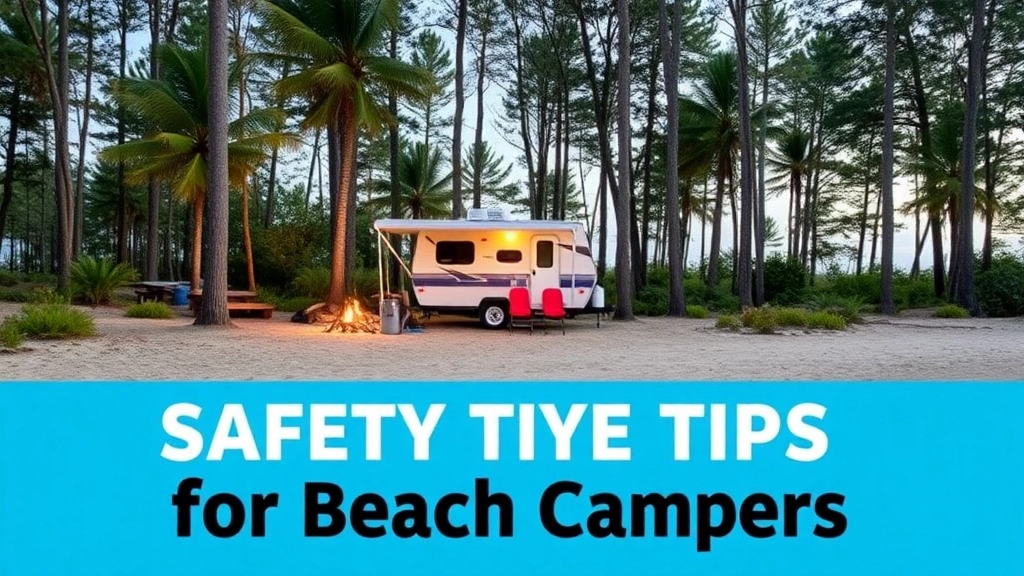
Alright, let’s get real for a second.
You’re probably thinking, “Is my kid going to be safe at this beach camp?”
Totally valid question.
Safety is a big deal, and you want to make sure your child is well looked after while having a blast.
So, let’s dive into some practical safety tips for beach campers.
Stay Hydrated
First up, hydration.
It’s easy to forget to drink water when you’re having fun.
But dehydration can sneak up fast.
Pro tip:
- Pack a reusable water bottle.
- Encourage your child to take regular sips, even if they don’t feel thirsty.
Sun Protection
Next, let’s talk about the sun.
We all love a sunny day at the beach, but sunburn? Not so much.
Make sure your child is well-protected.
Here’s how:
- Sunscreen: SPF 30 or higher. Reapply every two hours.
- Hats and Sunglasses: Protect those little faces and eyes.
- Shade: Take breaks under a beach umbrella or shade tent.
Water Safety
Now, onto the water.
The ocean is amazing, but it’s also powerful.
Water safety is crucial.
Key points:
- Swim in designated areas: Lifeguards are your friends.
- Buddy system: No one swims alone.
- Know the currents: Teach your child about rip currents and what to do if they get caught in one.
First Aid Basics
Accidents happen.
A basic first aid kit is a must.
Include:
- Band-aids
- Antiseptic wipes
- Tweezers (for those pesky splinters)
- Pain relief medication
Wildlife Awareness
Be aware of the local wildlife.
Some beaches have jellyfish, crabs, or even sea urchins.
Tips:
- Teach your child not to touch unknown sea creatures.
- Know the signs of jellyfish stings and how to treat them.
Staying Together
And finally, let’s talk about staying together.
Beach camps can be big, and it’s easy to get separated.
Tips:
- Set a meeting point.
- Make sure your child knows the camp’s schedule and locations.
- Consider a waterproof ID bracelet with your contact info.
Testimonials and Reviews from Campers
So, you’re thinking about sending your kid to a beach camp, but you’re not quite sure if it’s the right fit? Let’s cut to the chaseâhearing it straight from the horse’s mouth can make all the difference. Here are some testimonials and reviews from campers who’ve been there, done that, and got the suntan to prove it.
Real Stories from Real Campers
“Best Summer Ever!”
“I was a bit nervous about going to beach camp at first. I mean, who wants to leave their Xbox for a week, right? But wow, it turned out to be the best summer ever! We did everything from surfing to beach volleyball, and I made friends that I still chat with online. If you’re on the fence, just do it. You won’t regret it.” – Jake, 14
“A Parent’s Perspective”
“I was hesitant to send my daughter to beach camp because she’s not the most outdoorsy kid. But she came back glowingâliterally and figuratively. She learned so much about marine life and even picked up some new hobbies like paddleboarding. The best part? She was off her phone for an entire week!” – Sarah, Mum of Emily, 12
“More Than Just Fun”
“Beach camp was more than just fun in the sun. The counsellors were incredible, and the activities were well-organised. My son came back more confident and independent. Plus, he couldn’t stop talking about the bonfire nights and the talent show. It was a win-win for us.” – Tom, Dad of Lucas, 13
What Makes Beach Camp Special?
- Unforgettable Activities: From surfing to snorkelling, the range of activities keeps kids engaged and excited.
- Lifelong Friendships: Campers often form friendships that last long after the summer ends.
- Skill Development: Beyond fun, kids learn valuable skills like teamwork, leadership, and problem-solving.
- Nature Connection: It’s a break from screens and a chance to connect with nature, which is something we all need.
Why These Testimonials Matter
Hearing directly from campers and their parents can put your mind at ease. It’s not just about the activities; it’s about the overall experience and the lasting impact it has on your child. If you’re still unsure, check out more reviews online or speak to other parents who’ve sent their kids to beach camp. Trust me, the real-life experiences speak volumes.
Ready to dive in? Discover the top features of summer camp buildings to get started. And if you’ve got more questions, our ultimate packing guide section has got you covered.
How to Register for a Summer Camp Beach
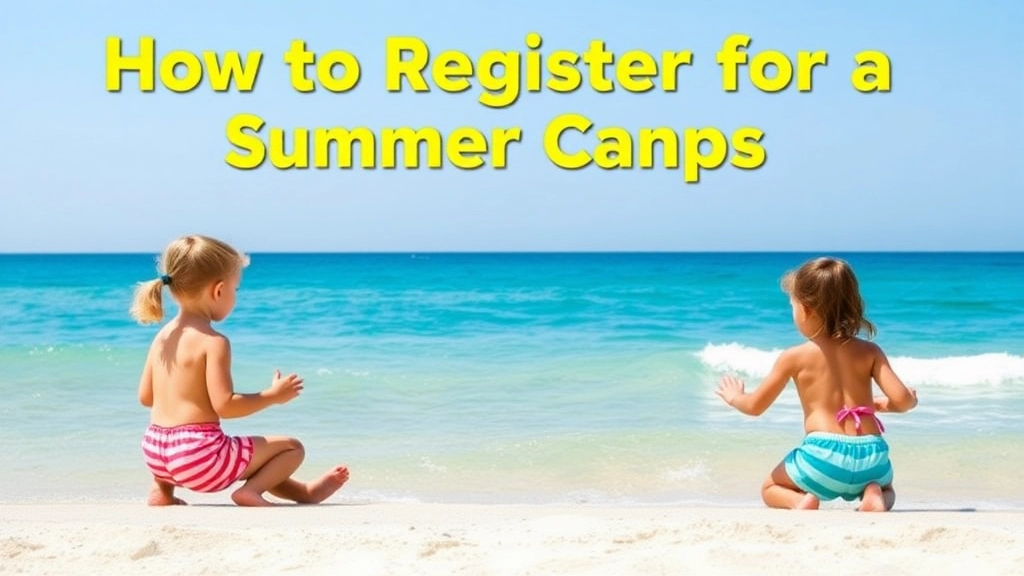
Thinking about signing up your child for a summer camp beach adventure? You’re not alone. Parents often wonder about the process, the costs, and the best options out there. Let’s break it down.
Why Registering Early Matters
First off, registering early is key. Popular camps fill up fast, and you don’t want your child to miss out. Plus, early birds often get discounts.
Steps to Register
Here’s a simple guide to get you started:
- Research Camps: Look for camps that match your child’s interests. Check out reviews and testimonials.
- Visit Websites: Most camps have detailed info on their websites. Look for the registration section.
- Contact Camp Directors: Got questions? Reach out. They’re usually happy to help.
- Fill Out Forms: Most camps have online registration forms. It’s quick and easy.
- Payment Options: Look for flexible payment plans. Some camps offer instalments.
What to Consider
- Location: Is the camp close to home or do you need to plan travel?
- Duration: How long is the camp? A week, a month?
- Activities: Does the camp offer activities your child will love?
Real Concerns
Worried about safety or if your child will fit in? These are common concerns. Talk to other parents or read reviews. You’ll find that camps are well-prepared and inclusive.
Frequently Asked Questions about Beach Camps
Got questions about beach camps?
You’re not alone.
Let’s dive in and tackle the most common queries head-on.
1. What age groups are beach camps suitable for?
Most beach camps cater to kids aged 7-17.
Some even have special programs for younger tots or teens.
2. What activities can my child expect?
Expect a mix of:
- Water sports: Surfing, kayaking, paddleboarding
- Beach games: Volleyball, sandcastle building
- Nature exploration: Tide pool walks, marine biology lessons
3. Are beach camps safe?
Safety is a top priority.
Camps have:
- Trained lifeguards
- First-aid certified staff
- Strict supervision ratios
4. What should my child pack?
Essentials include:
- Swimsuits
- Sunscreen
- Hat and sunglasses
- Water bottle
- Beach towel
5. How do I know if a beach camp is reputable?
Look for:
- Positive reviews
- Accreditation
- Experienced staff
6. Can non-swimmers join?
Absolutely.
Many camps offer beginner swimming lessons and ensure all kids are safe.
7. What about food and accommodation?
Most camps provide:
- Nutritious meals
- Comfortable lodging or tents
- Special dietary options
8. How much does it cost?
Prices vary.
Expect anywhere from £200 to £1000+ depending on the duration and amenities.
9. How do I register?
Usually, it’s as simple as:
- Visiting the camp’s website
- Filling out a form
- Paying a deposit
10. What if my child gets homesick?
It’s natural.
Camps have:
- Supportive staff
- Activities to keep kids engaged
- Ways to stay in touch with home
Still have questions?
Reach out directly to the camp.
They’re there to help.
Frequently Asked Questions (FAQs)
What activities are offered at a summer camp beach?
Summer camp beaches offer a wide range of activities beyond just sandcastles and swimming. These include:
- Water Sports: Surfing, kayaking, and snorkelling.
- Team Sports: Beach volleyball, soccer, and capture the flag.
- Creative Workshops: Sand sculpting, tie-dye, and various art and craft activities.
- Adventure and Exploration: Beach hikes, marine biology sessions, and night-time bonfires.
- Life Skills: Leadership programs, first aid training, and environmental awareness.
Why do kids love beach camps?
Kids love beach camps because they offer a mix of fun and learning. Activities help them gain confidence, make friends, and discover new passions, all while getting a break from screens.
How do I choose the right beach camp for my child?
Choosing the right beach camp involves considering several factors:
- What are your child’s interests? Look for camps that offer activities they love.
- Location: How far are you willing to travel, and is the camp’s beach safe and clean?
- Camp philosophy and values: Ensure they align with what you want for your child.
- Safety: Check staff qualifications, camper-to-staff ratio, and safety protocols.
- Testimonials and reviews: Ask for recommendations and read online reviews.
- Cost and inclusions: Understand what the fee covers and if there are any extra costs.
- Special needs: Check if the camp accommodates allergies or special dietary needs.
What are some safety tips for beach campers?
Safety is crucial at beach camps. Here are some tips:
- Stay Hydrated: Pack a reusable water bottle and encourage regular sips.
- Sun Protection: Use sunscreen (SPF 30 or higher), wear hats and sunglasses, and take breaks in the shade.
- Water Safety: Swim in designated areas, use the buddy system, and understand ocean currents.
- First Aid Basics: Pack a basic first aid kit with band-aids, antiseptic wipes, tweezers, and pain relief medication.
- Wildlife Awareness: Teach your child not to touch unknown sea creatures and know how to treat jellyfish stings.
- Staying Together: Set a meeting point, ensure your child knows the camp’s schedule, and consider a waterproof ID bracelet.
How do I register for a summer camp beach?
Registering for a summer camp beach involves several steps:
- Research Camps: Look for camps that match your child’s interests and check reviews.
- Visit Websites: Most camps have detailed info and online registration forms.
- Contact Camp Directors: Reach out if you have questions.
- Fill Out Forms: Complete the online registration forms.
- Payment Options: Look for flexible payment plans.
Registering early is key as popular camps fill up fast and early birds often get discounts.
What should I consider when registering for a camp?
Consider the following:
- Location: Is the camp close to home or will you need to plan travel?
- Duration: How long is the camp?
- Activities: Ensure the camp offers activities your child will love.
If you have concerns about safety or your child fitting in, talk to other parents or read reviews. Most camps are well-prepared and inclusive.
References
-
Choosing the Right Summer Camp for Your Child
-
Summer Camp Tips for Parents
-
Beach Safety Tips for Parents

